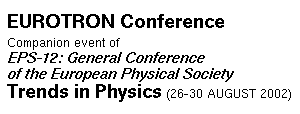 |
 |
 |
The discrete microscopic structure of the macroscopic objects was postulated since the time of Democritus. The crucial relevance of this fact for their actual properties became evident in the modern times starting with the Dalton laws in chemistry and culminated in physics with the statistical atomic-molecular mechanics of Boltzmann and Maxwell.
It turns out that in systems with auto-catalytic interactions (proliferation, contagion, information spread) as most biological and social systems are, the discreteness of the elementary components and interactions (e.g. giving birth to a new individual, informing a neighbor of a new product, adoption of a new idea by an individual, contracting a disease) is even more crucial.
Indeed, for many of such systems the continuum approximation (ignoring microscopic discretness) would predict an uniform, static (life-less, trade-less, idea-less) asymptotic state. In reality such systems present generically emergent spatio-temporal localized objects with unexpected collective dynamical properties: adaptability, resilience and sustainability.
I will present this generic mechanism of emergence of macroscopic complexity from microscopic noise and its application to a few social phenomena.
The following files are available:
- abstractsolomon.pdf [8661 bytes]
- abstractsolomon.doc [38400 bytes]
Eurotron Conference is supported by European Commission, High-Level Scientific Conferences